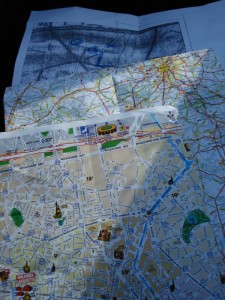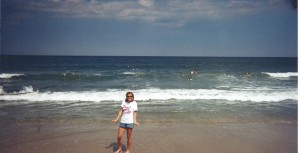A few weeks ago Pam did a blog post on being a slow reader and her love for long epic fantasies. I was really inspired to write a similar post, but as I wrote I started thinking of all the books I’d read that really made me fall in love with reading.
And I realized I never really did. Fall in love with reading that is—not at first.
For me it was a genuine desire to escape into a new world. The best genre for that (for me) was science fiction. At ten I became a huge fan of Star Trek and in fifth and sixth grade I became addicted to the tie-in books in that universe. In eight grade I read Dune. I also liked sad animal books. You know the ones: Old Yeller, Where the Red Fern Grows. I raised guide dogs for the blind (a volunteer project that followed me into adulthood) and so I knew what it was like to lose a furry friend. With very few other kids my age with the same experience to talk to, I used the made-up worlds as my counselors.
Except for one problem. I didn’t read very well. I had pretty poor comprehension (as tests showed throughout my school career). When I’d read out loud, it was choppy and disconnected. If I read something out loud, I couldn’t really understand what I’d read. It was as if my brain turned off. I always read slowly. I’d read the same paragraphs over and over, and never really retain all the details in a story…but I kept at it. My love for wonder outweighed my struggle.
I wrote slowly, too. I misspelled simple words over and over. I had difficulty learning another language. To this day I have a list of words (some of them pretty common) that are hard for me to pronounce correctly. Grammar baffled me. I knew all the major rules, but when it came to applying them I found it very difficult. As it got harder and as teachers become more frustrated, I gave up reading for pleasure. Most of my time in high school and beyond was dedicated to reading the texts I was assigned. I’d have to read a book or a history chapter several times to comprehend the basic information. I got headaches from staring at writing for too long.
My vision was checked several times.
I didn’t need glasses.
Notes taken while people were talking would mostly come out as sloppy gibberish.
I had a few charms going for me. I took theatre, so reading the same thing over and over and performing it taught me some classics that I’ll know inside and out (probably forever)—most of it Shakespeare. I could draw really well. I was good at math. And I really loved learning. Learning everything.
I took remedial English in college. I went to the writing center for help writing papers. Often my in-class work and homework were vastly different in quality. I’ve been accused of cheating several times. My boyfriend (now husband) had been accused of writing papers for me. His response? “I barely have time to do my own work.”
I loved his response. He proof-read my papers for me and offered corrections only some times, but after a while I stopped asking, because people assumed my high grades were in some way connected to his effort in helping me and it simply wasn’t true.
English teachers were confused by me and also frustrated with me. “You obviously struggle with this,” they would say. They’d see my immense effort on a project and it must have looked like I’d maxed out on my IQ ability in that particular area. A lot would refuse to give up insisting that writing is a skill we use the rest of our lives, but many, towards the end would try to pat me on the back and assure me that it was not important. I wasn’t going to be a writer. It didn’t matter.
I was never encouraged to write my ideas down. I had never been told some day I’d be good at this. I was never compared to well known or loved authors. I was nobody’s pick at a future profession in storytelling.
I know I’m not the typical “how I became a writer” fairytale.
When I was young I’d read a good book and instantly think of my own story to tell. I had piles of piles of stapled together books where I’d draw pictures for the scenes. The place where the words would go would be blank. I’d buy notebooks and sketch story ideas. For my eighth grade project I wrote the first chapter to a middle grade novel. My high school project I wrote and illustrated a children’s book. For my graduate thesis I studied subjective grading methods in writing and using a rubric to help students improve. I was very obviously interested in writing, but putting words to paper terrified me. Reduced me to tears. Every paper was an opportunity to explain to a teacher that I was not the bright student they expected based on my interactions in class. That I preferred audiobooks (when I could find them) and cliff notes as my go-to study aids. I had professors write me nasty notes on my assignments alluding to my lack intellectual ability. At the same time I graduated in the top five percent of my college, with honors in my major (undergrad), distinction (graduate school), and probably more scholarships than most students are blessed with. I was surely a confusing puzzle.
In college I was diagnosed with dyslexia. I have a strong family history of dyslexia. Several members in my family have been diagnosed. I have a very specific kind and I’m lucky that I have coping strategies and workarounds that enabled me to get as far as I had. At the point of my diagnosis I felt that I’d used every tool at my disposal and I’d nearly accepted I had hit the peak of what I was capable of.
What saved me? First, finding out I was dyslexic felt like newfound freedom. Like I had been drowning under a frozen lake and broke through the ice. A lot of people hate diagnosis, hate labels. It’s a fifty-fifty shot. Sometimes it holds people back and other times it gives them the room to grow. For me it was the latter. Dyslexia is different for different people. There are different types, different shades on the spectrum. I also have some sensory integration issues (mostly with sound). Every person has different body chemistry and different history. So what worked for me, or my story might not to translate others with the same diagnosis.
Second, it was working with dyslexic students. I was working on my graduates degree in school psychology and I diagnosed and treated children with learning, behavioral, and emotional disabilities. Which was pretty damn convenient for my professors after they diagnosed me. I suddenly had a full caseload of kids with reading problems to come up with treatment plans for. The catch? I had to do the tasks and assignments right along with them. I read Overcoming Dyslexia by Sally Shaywitz and other really great books on the subject to help come up with unique treatment plans. One little girl had a great spirit; she reminded me of myself at that age. This kid never gave up and always stayed after school to ask her teacher for ways to make up work she did poorly on. She wasn’t afraid to work hard, so why would I be?
Third, I picked up reading again. At first it was with audiobooks, then I went to the store and browsed the fiction section. Weary of titles and back covers that all sounded the same, I saw one that was perfect. It had fantasy, Scottish history (I’m a sucker for men in kilts; one of my never-written stories as a child featured a Scottish girl traveling across country by herself searching for her parents), romance, and it was long and epic! It sat on my self for a year before I read it. I think I read a hundred romance books before I finally got up the guts to read Outlander (that epic, fantasy, Scottish history, romance, and all around amazing book that is now a show).
This is the hardest experience for me to write about, or even talk about. Especially among other writers—because they know me now. They know I’m “not that bad” and I’m “too hard on myself” or “I use dyslexia as an excuse to continue to be lazy with grammar.” I’m sure it really does look that way. Fifteen years ago my writing looked very different. There is a handful of people who know my real journey and only because they knew me then (and corrected my notes of grammar/spelling errors when we’d pass them between class—you know who you are). And so when my parents, siblings, family, long time close friends, or my husband says they see my improvement, or that they’re proud of me—it’s the only time I get choked up about it. Because they know.
I love comments! Every time you comment a slow reader gets a rocket power boost to the next paragraph.
 There are only a handful of moments in life that define you, that you remember vividly years later. When you say, “Yep, that was when it happened.” One of those moments came when I finally decided to take a writing class from Margie Lawson.
There are only a handful of moments in life that define you, that you remember vividly years later. When you say, “Yep, that was when it happened.” One of those moments came when I finally decided to take a writing class from Margie Lawson.


